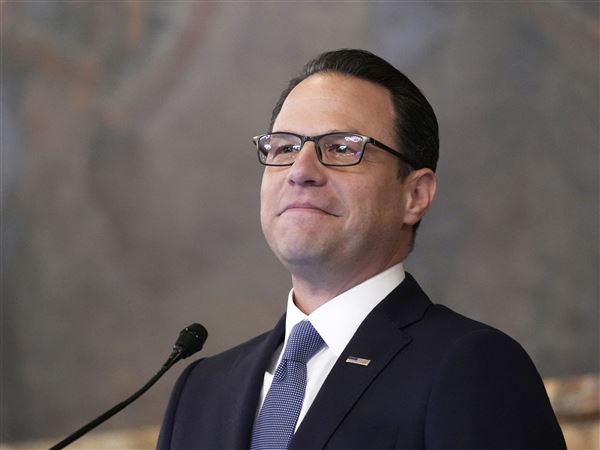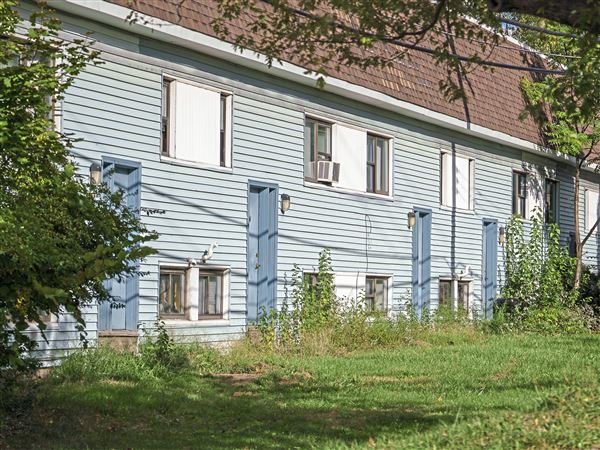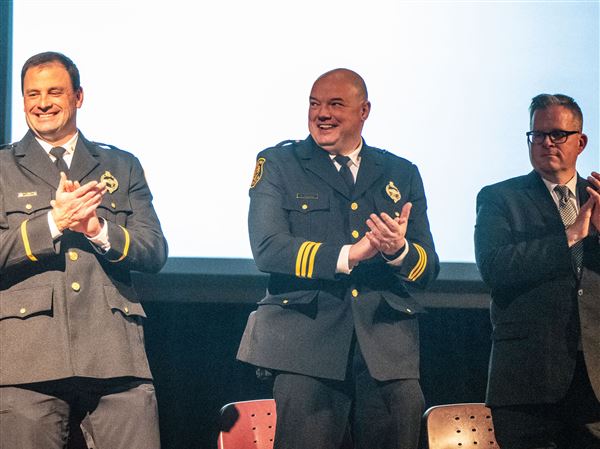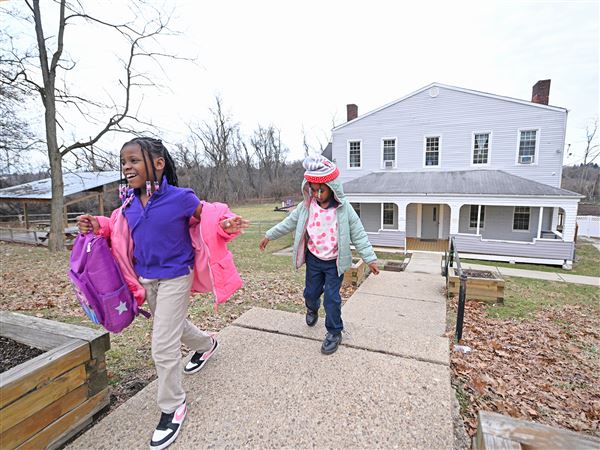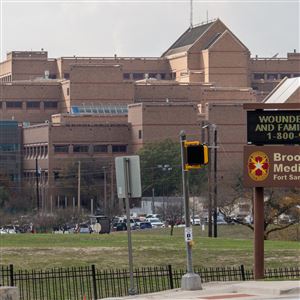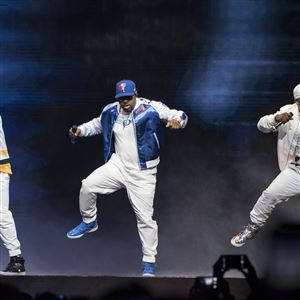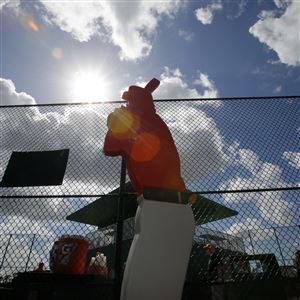It's a cold February afternoon, the streets are lined with dirty piles of plowed snow, but they're clear enough for Tom Maringo to motor his scooter through his Elizabeth Township neighborhood.

Like many teens and preteens, Maringo has the hot new means of transportation, a motorized scooter. The 14-year-old uses his gasoline-powered scooter for business and pleasure.
He hums along on his Viza Viper most weekdays delivering newspapers to 37 homes in a neighborhood with three steep hills.
But every time he does it, he's breaking the law.
That's because, the Pennsylvania Department of Transportation says, motorized scooters are motor vehicles and may not be ridden on public streets, sidewalks or parking lots.
Many people don't realize state law restricts use of the small, two-cycle gasoline engine- or electric motor-and-battery-powered scooters to private property.
As winter's snow and ice gives way to spring's warm breezes and longer hours of daylight, more and more of these scooters are expected to be seen on the street, creating an enforcement dilemma for local police departments.
Maureen Young, of North Huntingdon, didn't know about the law until she was told by a reporter. Young said she or her husband always supervised their 10-year-old son when he rides the scooter around their neighborhood.
"I think [the law] goes too far. It's a scooter with a battery on it, he can go faster on his bicycle," she said.
Motorized scooters, which cost between $200 and $1,500, reach speeds ranging from 8 to 25 mph.
Under state law, anyone driving a scooter on public property can face up to $600 in fines and penalties, as well as have his scooter impounded. How strictly the law is enforced varies from municipality to municipality. Most police departments give parents warnings for a first offense. But a second offense can lead to a citation or impoundment.
In Elizabeth Township, where Maringo lives, police Chief Robert Wallace said for a first offense, parents of a child on a scooter are given a warning. For the child's second offense, the scooter will be impounded and the parents given a citation.
Bethel Park police Chief John Mackey said he was able to resolve a series of complaints about motorized scooters without citations last summer.
"They have a place, but not on the streets," he said. "You can't see them coming out behind cars. It's a tragedy waiting to happen."
Sewickley police Chief John Mook said motorized scooters were a classic case of technology preceding legislation. He finds PennDOT's interpretation of the law to be ambiguous.
"I find it to be unenforceable. It makes the police look bad." He gives warnings to youngsters riding them on the borough's streets.
"PennDOT is not standing before a judge with a 10-year-old kid," Mook said.
It's a question of safety, PennDOT spokeswoman Joan Nissley said. "The motor vehicle code is based on safety."
PennDOT says a motorized scooter is a motor vehicle because it has a motor and doesn't qualify for any of the exemptions under the motor vehicle code. Yet they aren't made, sold or bought with state motor vehicle codes in mind. Buyers don't get a title with their purchase, so they aren't registered with the state. Even if they were, there's no place to carry a license plate or a valid inspection sticker. The sticker can't be issued because scooters don't have the safety features, such as bumpers, seat belts, lights and horns, needed to pass an inspection.
PennDOT says that like other motor vehicles, these scooters should be insured and drivers should have a valid license to operate them on the street. Only scooters used by the physically challenged are an exception to the state Motor Vehicle Code.
With safety in mind, Nissley said, PennDOT issued a "buyer beware" news release in November aimed at making parents aware of the law if they were considering the scooters as Christmas presents.
"It's best these vehicles remain on private property," Nissley said.
But finding suitable private property may not be that easy. First, riders must have the property owner's permission. City and county parks, school parking lots and bike trails are all off limits.
Some municipalities have ordinances that restrict a scooter's use on private property. In Elizabeth Township, for example, they can't be ridden on private property within 300 feet of a residence, and they can't raise dust or make unnecessary noise. The safety of these popular scooters is of increasing national concern. According to Scott Wolfson of the U.S. Consumer Product Safety Commission, motorized scooters caused an estimated 6,000 injuries needing emergency room treatment in 2002. That's up from the 4,390 injuries reported in 2000.
The commission also had reports of three scooter-related deaths. A 6-year-old California boy died after falling off a motorized scooter and an 11-year-old Pennsylvania boy died when his scooter crashed into a truck. A 46-year-old California man died after being struck by an automobile. All suffered head injuries; none was wearing a helmet.
That's not to say foot-powered scooters are automatically safer. Wolfson said they caused an estimated 60,000 emergency-room treated injuries and 16 deaths through the spring of 2002.
As a result, the commission recommends helmets for all scooter riders, as well as knee and elbow pads. It also recommends motorized scooters not be driven at night, and that children under 12 not ride them at all.
And it suggests owners check with local authorities for riding guidelines and restrictions. So did some Web sites that sold scooters over the holidays.
Zapworld, a San Diego-based company, has been manufacturing electric scooters for nine years and sells them on the Internet.
Spokesman Alex Campbell said the Zap, or Zappy, scooters, which stands for "zero air pollution," are built to be a form of efficient transportation, "not as a cheap throwaway toy."
Campbell said he parked his car outside the city and rode his electric scooter two miles to his office, where he folded it up under his desk.
He said Zapworld, which sold $12 million in scooters in 2000, recommended riders wear a helmet and that children under 16 not ride without adult supervision.
He said California's motorized scooter law was a reasonable one, restricting them to a maximum speed of 15 mph and prohibiting anyone under 16 from riding them on public streets and sidewalks.
His reaction to Pennsylvania's law?
"Parents should watch their kids better and take the pressure off traffic enforcement," Campbell said. "This is backwards. Shouldn't kids be allowed to play?
"Why should cars rule our lives? Shouldn't drivers be responsible? Where's the real crime here?"
State Sen. Sean Logan, D-Monroeville, got a call from a 12-year-old complaining about PennDOT's interpretation of the law.
Logan said he was pleased with PennDOT's stance on the issue and he was not aware of any legislation in Harrisburg to change it.
"I don't think any reasonable legislator would allow them on our streets," he said.
Nonetheless, Maringo said, he'll keep riding his scooter on the street until the police make him stop.
"I follow all the traffic laws," he said, noting he bought his scooter two years ago with his own money on eBay for $450.
"I stop at stop signs and if there's a car coming up behind me, I let them go."
His father, Tom Maringo Sr., understands PennDOT's concern. "They can be dangerous and I feel there is a need to regulate them. But I think [PennDOT] is going a little overboard."
First Published: February 18, 2004, 5:00 a.m.
